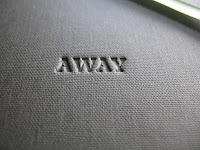 As I reviewed both Home and Housekeeping by Marilynne Robinson for the blog at work, The Savvy Reader, it’ll be a duplication of efforts to re-write them here. So I’m cutting and pasting from my original review:
As I reviewed both Home and Housekeeping by Marilynne Robinson for the blog at work, The Savvy Reader, it’ll be a duplication of efforts to re-write them here. So I’m cutting and pasting from my original review:
The first Marilynne Robinson novel that I read was Gilead, and what a reading experience it was, exhilarating would be a good descriptive word. That novel sent me reeling forward headlong into Home, which comes out this fall, and follows many of the same characters from Gilead. Glory has come home to take care of her father, Reverend Robert Boughton (neighbour and best friend of John Ames), as his health declines in old age. It begins:
While, this new novel takes place concurrently with Gilead, you don’t have to have read the first book to enjoy this one, as the stories, while they have similar plot points and some of the same characters, are extremely different.
The assured nature of Robinson’s voice, her ability to tell a story, and the emotional depth of the relationships between the elder Boughton and his children, bring you right into this novel from the very first page and just don’t let you go. As both Glory and her father await the return of Jack (brother and favourite son), who has been away from Gilead for twenty years, it’s apparent that his presence will change their lives irrevocably and as only family members can. In many ways, Jack’s visit is a blessing and a curse, as it brings both Glory and her father closer together but also forces them to reflect on the past, an exercise that truly brings out the richness in Robinson’s writing.
When I finished the book at the cottage last weekend, I actually hugged the book. I may have uttered an, “Oh, Glory!” or two, as well. The novel picks you up and drops you so wholly into these characters that you can’t help but want to reach into the book and hold them, befriend them, debate with them, and simply enjoy the pleasures in their lives.
Of course, my adoration of Home sent me reeling, again, for more of Marilynne Robinson, which led me to read her first book, Housekeeping. I’ve only just begun, but I am already enthralled by Ruthie’s story. Here’s a passage I read this morning in transit:
What do your lighted windows display? Right now mine would be filled to the brim of thoughts about Marilynne Robinson’s books.






